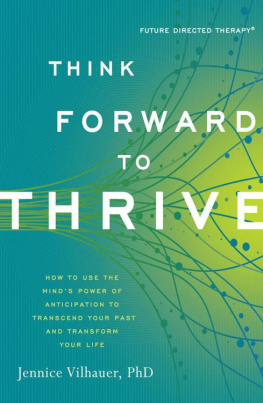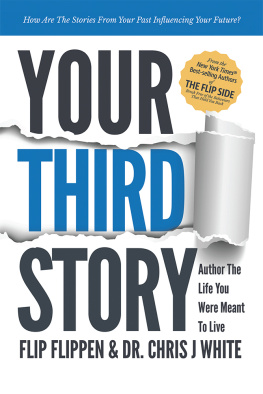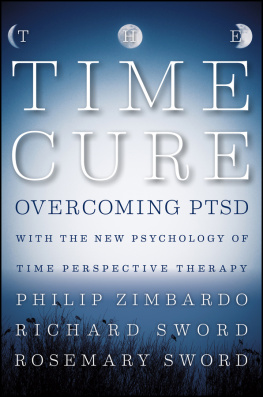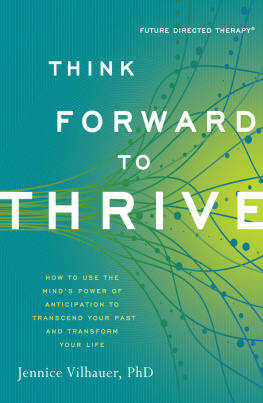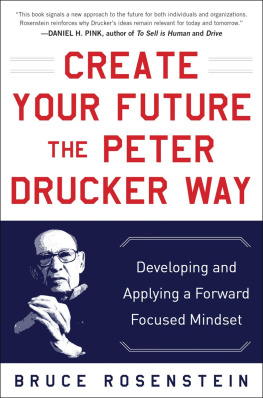M ORE PRAISE FOR T HINK F ORWARD TO T HRIVE
The one thing we have dominion over in our life is our thoughts, but so many of us are trapped in habitual or worrisome thinking that is not creating the results we desire in life. With cutting-edge techniques, Think Forward to Thrive empowers us to think in a way that not only supports our well-being in the moment but also creates a desirable future.
Christine Hassler, author of Expectation Hangover and 20 Something, 20 Everything
You hold in your hands a wonderful vehicle for getting unstuck from the ruts of depression, anxiety, and hopelessness. Jennice Vilhauer skillfully blends inspiring, anecdotal stories with evidence-based skills and tools designed to help anyone participate more fully in her or his life. If youve ever wanted to be more in control of where your emotions, thoughts, beliefs, and actions were leading you, Think Forward to Thrive can give you the kind of positive traction necessary to move forward and toward a more fulfilling and transformative life journey. Highly recommended!
Donald Altman, MA, LPC, author of The Mindfulness Toolbox and One-Minute Mindfulness
If you feel stuck or find yourself struggling to meet your goals, this may be the most important book you will ever buy. Basing her work on current neuroscience research, Jennice Vilhauer has created an accessible guide for breaking free of the past and learning to live the life you want.
Marissa Burgoyne, PsyD, psychologist, Pepperdine University and UCLA
FUTURE DIRECTED THERAPY
T HINK F ORWARD
TO
T HRIVE



| New World Library 14 Pamaron Way Novato, California 94949 |
Copyright 2014 by Jennice Vilhauer, PhD
All rights reserved. This book may not be reproduced in whole or in part, stored in a retrieval system, or transmitted in any form or by any means electronic, mechanical, or other without written permission from the publisher, except by a reviewer, who may quote brief passages in a review.
The material in this book is intended for education. No expressed or implied guarantee of the effects of the use of the recommendations can be given nor liability taken. Some names have been changed to protect the privacy of individuals.
Text design by David Moratto
Library of Congress Cataloging-in-Publication Data
Vilhauer, Jennice.
Think forward to thrive : how to use the minds power of anticipation to transcend your past and transform your life / Jennice Vilhauer.
pages cm
Includes bibliographical references and index.
ISBN 978-1-60868-298-0 (paperback) ISBN 978-1-60868-299-7 (ebook)
1. Self-actualization (Psychology). I. Title.
BF637.S4.V55 2014
158.1dc2. 2014013793
First printing, October 2014
ISBN 978-1-60868-298-0
Printed in Canada on 100% postconsumer-waste recycled paper
 | New World Library is proud to be a Gold Certified Environmentally Responsible Publisher. Publisher certification awarded by Green Press Initiative. www.greenpressinitiative.org |
10 9 8 7 6 5 4 3 2 1
To my patients and my students, who always inspire me this is for you .
The future belongs to those who believe in the beauty of their dreams .
ELEANOR ROOSEVELT
CONTENTS


It is far more important for man to know whom he wants to become than who he is now .
JOSEPH NUTTIN
E veryone wants to feel good, everyone wants to thrive, yet many people dont know how to make this happen. Future Directed Therapy (FDT) is a whole new approach to improving how we function, based on the idea that because we can only move forward in time, we can only fully be understood as beings continuously in the process of becoming. The future in Future Directed Therapy is not necessarily far off in time; it can refer to any point in time beyond the present moment, near or far. Rather, FDT is about understanding that because we can only move forward, most of our thinking and behavior is anticipatory or future oriented. We constantly speculate about what will happen , whether in the very next moment, tomorrow, or five years from now, and that has a huge impact on how we process information, how we feel about different situations, how we interact with our environment, and ultimately how we create our lives.
Although we often think the past dictates our behavior, the future is what really motivates most of our actions. Whether you are motivated to go to the kitchen because you anticipate eating something delicious, or you are motivated to save money because you want to buy a new home, or you are motivated to take any other action you could possibly imagine, you act because you expect a certain desired result. The past is relevant only to the extent that we use it to predict the future.
A primary premise of Future Directed Therapy is that what people want (any desired future state) is the fundamental motivating force behind their behavior. Often we act to avoid something undesirable, but it is our desire to avoid the unwanted that drives our behavior. For example, if you decide not to go to an anxiety-provoking party, it is because you want to avoid an uncomfortable situation. Because we believe that the things we want will bring about some desired future state, when we focus our thinking on what we want, we experience positive emotions. When you think about having a positive experience in the future or getting something you want, you feel great; when you think about taking actions to avoid an uncomfortable situation, you feel relief.
However, when we focus on what we dont want, we experience emotional distress and suffering. If instead you think about missing out on an opportunity to see your friends or disappointing the person who invited you to the party, you may feel guilt or sadness. We can have thoughts about both the wanted and the unwanted aspects of any situation. If you want to lose weight, you can think about how great it will feel when you do (wanted) or how lousy it is to give up your favorite foods (unwanted). Our minds tend to jump between wanted and unwanted situations all day long without our ever even realizing it is happening.
The key to thriving is learning to harness the minds natural tendency to anticipate the future so that you can focus most of your attention on what you would like to achieve. This not only brings you positive emotions, but it also activates a series of mental functions that actually increase your ability to obtain what you desire. Whenever you think about your desired future state, several solution-generating, problem-solving mechanisms in your brain kick into gear. However, when you focus on what you dont want and you experience the resulting negative emotions, this inhibits the area of your brain responsible for these functions from working properly. The longer you think about what you want, the harder these mechanisms work, often leading to ideas and solutions that never would have occurred to you if you had not focused on your desired future.
Next page
